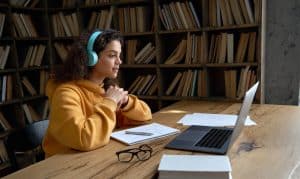Electronic Music Production and Sound Design Workshop
Welcome to a place where your creativity and technology come together! If you’re a new college student who loves music and is curious about making cool sounds, then the Electronic Music Production and Sound Design Workshop is for you.
This blog will help you learn everything you need to know about this exciting workshop. It’s like your map for exploring and getting really good at making digital music. So, as you start your college journey, let’s dive into the world of electronic music together!
What is the Electronic Music Production and Sound Design Workshop?
At the Electronic Music Production and Sound Design Workshop, you’ll have the chance to push yourself and become a better electronic musician. You’ll learn about making cool sounds, creating music, and playing electronic instruments.
During the workshop, you can discover a lot of things. You’ll start with the basics of how sounds are made and recorded, and you’ll even learn how to make sounds for movies and video games. You can also try out different types of electronic instruments, like old-fashioned ones and the newest ones with special controls.
Depending on what you already know and what you want to learn, you can pick the classes that fit your interests. It’s a great opportunity to explore and improve your music and sound skills.
Why should you join the Electronic Music Production and Sound Design Workshop?
Why should you consider being a part of the Electronic Music Production and Sound Design Workshop? Well, there are some really good reasons!
When you join this workshop, you step into a world where you can let your creativity run wild. Imagine making all sorts of amazing music and sounds, there are no limits!
You’ll have the chance to learn from experts who work in the music industry. These are the people who know their stuff, and they’ll teach you all the tricks of the trade. You’ll get to use some cool, high-tech equipment. Think about using the same tools that famous musicians and sound designers use. It’s like being in a music playground!
And don’t forget, you’ll meet other people who love music just as much as you do. You can work together, share ideas, and make awesome music together. Plus, who knows, this workshop might be the start of your career in music and sound design. It’s a fantastic chance to learn, grow, and maybe even become a pro in the music world!
Electronic Music Production and Sound Design Workshop Curriculum Overview
The workshop offers a diverse curriculum with multiple classes happening simultaneously during each time slot. You have the freedom to choose which class you want to attend at any given time, as long as there’s enough space. These classes cater to different skill levels, from beginners to those with more experience.
Here’s a list of some classes to give you an idea of what’s available:
- Producing EDM with Ableton Live
- Creative Sound Design Techniques
- Sampling Workshop 1 and 2
- Sound Design with Modular Synthesizers
- Electronic Music Mixing Techniques
- Introduction to Game Audio
- Performing Live with Ableton Push
- Expressive Performance with MPE and the Roli Seaboard Rise
- Introduction to Circuit-Bending
- Sound Design for VR
- Introduction to DJing
- Composing and Performing with Ableton Live
- New Ways to Play
- Digital DJ Techniques
- Music of the Body and Mind
All of these breakout sessions take place in Berklee’s modern labs and studios. These facilities are equipped with the latest technology, including software like Ableton Live, MAX for Live, Logic, and Native Instruments Komplete.
Additionally, there are other opportunities like:
Electronic performance controller lab: This is a special place where you can try out and experiment with electronic music controllers. It’s like a playground for electronic music enthusiasts, where you can get hands-on experience with all sorts of cool gadgets used to make electronic music. It’s the perfect place to learn and have fun while creating music!
Modular synthesizer open lab time: During this period, you’ll have the opportunity to spend time working with modular synthesizers. It’s a designated time where you can explore and experiment with these fascinating electronic music instruments. Think of it as your dedicated space to get creative with modular synthesizers and create unique sounds. Whether you’re a beginner or more experienced, it’s a fantastic chance to learn and have fun with this exciting equipment!
Turntable open lab time: This is a special time where you can practice and improve your DJ skills using turntables. It’s like having your own DJ playground! Whether you’re just starting to learn how to DJ or you’re looking to enhance your skills, this dedicated time is perfect for honing your craft. You’ll get hands-on experience with turntables and all the gear you need to become a skilled DJ. It’s a great opportunity to have fun and become a pro at spinning tunes!
Ableton Live tutorial sessions: In these sessions, you’ll receive practical, hands-on guidance for using Ableton Live. It’s like having a helpful guide to show you how to use this powerful music software. Whether you’re new to Ableton Live or looking to improve your skills, these tutorials provide step-by-step instructions. You’ll get the chance to learn the ins and outs of the software, making it easier to create amazing music. It’s a fantastic opportunity to become proficient in using Ableton Live for your music production.
Electronic performance open mic: This is your chance to shine and show off your electronic music skills in a friendly and open environment. Think of it as a stage where you can share the music you’ve created with others.
It’s like a talent show for electronic music enthusiasts! Whether you’re a beginner or a pro, this open mic setting welcomes everyone. You can perform your electronic music, share your creations, and connect with fellow music lovers. It’s a fantastic opportunity to let your music be heard and appreciated by an audience.
The workshop provides a wide range of options for you to explore and enhance your electronic music and sound design abilities. It’s a fantastic opportunity to learn and grow in a creative environment!
A. Opportunities for Live Performances
Throughout the program, students will have several chances to showcase their talents in various open mic sessions. These events provide a platform for students to perform live.
How do you get into the Electronic Music Production and Sound Design Workshop?
If you’re 15 years old or older and have a bit of experience in electronic music production, you’re invited to be a part of the workshop. This workshop is open to students who already have some knowledge about making electronic music. So, if you’ve dabbled in electronic music before and want to learn more, you’re in the right place!
Creating Connections at Berklee’s Electronic Music Production and Sound Design Workshop: Tips and Advantages
Building a strong network during the Electronic Music Production and Sound Design Workshop at Berklee can significantly impact your journey in the music industry. Networking effectively at this workshop can open doors to numerous opportunities, valuable learning experiences, and lasting professional relationships. Here’s a guide on how to network effectively and the advantages you can expect.
I. Strategies for Building a Network
Engage with Instructors and Guest Speakers
The instructors and guest speakers at the workshop are usually experts with a lot of experience and many contacts in the music industry. Make the most of their presence by actively participating in sessions.
Ask questions that show you’re thinking deeply about the topics being discussed. If there’s an opportunity, try to have a conversation with them after the session. This could be about your musical interests, seeking advice, or learning from their career experiences.
These interactions can be incredibly valuable for gaining industry insights and potentially opening doors for future opportunities.
Collaborate with Peers
Collaborating with other participants in the workshop is a great way to build professional connections that could last long after the workshop ends. When you work on projects together, you have the chance to learn from each other and combine your skills.
It’s a good idea to partner with people who might have different abilities or who enjoy different types of music than you do. This mix of perspectives and talents can lead to more innovative and interesting project results.
For example, if you’re good at beat-making and you team up with someone who excels in melody, the collaboration could produce a unique and diverse piece of music. These collaborations not only enhance your learning experience but also lay the groundwork for future professional networks in the music industry.
Exchange Contact Information
It’s important to exchange contact information like email addresses, phone numbers, or social media profiles with the people you meet at the workshop. This step is crucial for keeping in touch after the workshop ends.
If you meet someone who shares your interest in a particular music style or software, exchanging contacts means you can continue to share ideas and collaborate even after the workshop.
By staying in touch, you maintain and strengthen these new relationships, which could lead to future collaborations, learning opportunities, or even career advancements in the music industry. Remember, the connections you make at the workshop can become valuable parts of your professional network, so make sure to keep the communication lines open.
Show Genuine Interest in Others’ Work
It’s important to show real enthusiasm for the work your fellow students are doing. Ask them about their projects, listen to their music, and provide helpful feedback. This kind of genuine interest can create a supportive environment.
If someone is working on an electronic track, you might ask them about their inspiration or the techniques they used, and share any positive insights or suggestions you have. This approach not only helps build a collaborative atmosphere but also encourages others to take an interest in your work.
When you show that you care about their projects, they’re more likely to reciprocate, leading to a more engaging and mutually beneficial experience for everyone involved.
Utilize Online Platforms
It’s a good idea to become active in online forums or groups that are connected to the workshop or Berklee College of Music. These digital platforms offer an excellent opportunity to keep the discussions going and share your music or projects even after the workshop is over.
For instance, if there’s a Facebook group or an online forum for workshop attendees, joining it allows you to stay in contact with peers, share your latest work, get feedback, and even collaborate on new projects.
These online communities can be a valuable resource for continuous learning, getting support, and keeping up with the latest news and opportunities related to electronic music production and sound design. They extend the networking and learning experience beyond the physical duration of the workshop, fostering a sense of ongoing community and connection.
II. Benefits of Networking
Career Opportunities
Creating a solid network during the workshop can be a significant stepping stone in your career. By connecting with instructors, industry professionals, and fellow students, you increase your chances of finding job opportunities, engaging in collaborative projects, and encountering various other professional chances.
A fellow participant you network with might later recommend you for a job opening, or an instructor could connect you with a music studio looking for fresh talent. These connections often play a pivotal role in launching and advancing careers in the music industry, as many opportunities come through personal recommendations and collaborations.
Learning and Growth
When you network with a wide range of individuals at the workshop, you expose yourself to various viewpoints and experiences. This diversity enriches your understanding and broadens your horizons.
Discussing music production techniques with someone from a different musical background can offer new insights and challenge your existing ideas, leading to a deeper and more comprehensive learning experience. Such interactions not only enhance your technical skills but also contribute to your personal growth as an artist and individual.
Engaging with different perspectives helps in developing a more well-rounded approach to music production and sound design, encouraging both professional and personal development.
Mentorship
When you connect with seasoned professionals during the workshop, these relationships have the potential to grow into mentorships. A mentor, who is experienced in the field, can offer invaluable guidance and advice for your career path.
A connection you make with an experienced sound designer or music producer could lead to them giving you personalized advice, helping you navigate the music industry, or guiding you in your projects.
These mentor-mentee relationships are incredibly beneficial as they provide not just technical advice but also insights based on real-world experience, helping you make informed decisions and avoid common pitfalls in your music career.
Collaborative Projects
When you meet other musicians and producers at the workshop, it can open up opportunities for working on projects together. Collaborating with others allows you to blend different styles and ideas, which can lead to producing unique music or sound designs.
You might team up with someone who has a different musical background, and together, create a fusion piece that showcases both of your strengths. These collaborations not only enhance your creative output but also help in building a diverse portfolio, showcasing your ability to work across various genres and styles.
Such projects can be valuable for your professional growth, as they demonstrate your versatility and capacity to collaborate effectively.
Creating a Network of Support
When you build a network, especially at a workshop like this, you’re also creating a group of people who get what it’s like to work in the music industry. They know the challenges and hurdles you might face.
This network becomes a support system where you can get advice and encouragement from others who have been through similar situations. For example, if you’re struggling with a particular aspect of music production, someone in your network might have useful tips or could share their own experiences on how they overcame a similar challenge.
Having this kind of support can make a big difference in navigating the ups and downs of a career in music. It’s not just about having contacts; it’s about having a community of peers and mentors who can offer guidance and support when you need it.
Access to Resources
The people you meet and connect with at the workshop can be a great source of resources that you might not have easy access to otherwise. For instance, someone in your network might have a home studio where you can record, or they could lend you specialized equipment or software for your music projects.
This kind of sharing and collaboration can be incredibly beneficial, especially when you’re starting out and might not have all the tools you need. It’s not just about physical resources; your network can also provide valuable information, like tips on where to find the best deals on music gear or recommendations for useful online tools and platforms. In essence, the connections you make can open doors to a variety of resources, helping you grow as a musician or producer.
Networking is about building genuine connections. Be authentic, respectful, and open to learning from others, and you’ll likely find that others are eager to connect and collaborate with you. This approach can significantly enrich your experience at the workshop and pave the way for future opportunities in the world of electronic music production and sound design.
How do I apply to the Electronic Music Production and Sound Design Workshop?
To secure your spot in the workshop, the first step is to complete your registration. You can easily do this online. If necessary, you might also need to send in some extra documents to support your application.
It’s important to make sure you pay your tuition fees by May 1st. Since there’s limited space available for each program, paying your full tuition is important to guarantee your spot.
If you’re 15 years or older when the Boston-based program starts and you’d like to stay on campus, you can request on-campus housing. If you meet these requirements and want to live on campus, just go back to your registration portal and submit a Residence Hall Agreement.
Following these steps will ensure that you’re all set to embark on your musical journey at the workshop. Remember to meet the deadlines to secure your spot!
Electronic Music Production and Sound Design Workshop Costs
The cost for the workshop is as follows:
- The regular tuition fee is $2,925. However, if you register by January 15, 2024, you can take advantage of a discounted rate of $2,725.
- The cost of housing during the workshop is $895.
- There is also a registration fee of $50, which is nonrefundable.
Make sure to register early to save on your tuition!
How hard is getting into the Electronic Music Production and Sound Design Workshop?
Gaining entry into the Electronic Music Production and Sound Design Workshop can be challenging due to its limited space. Simply submitting your registration documents does not ensure you a place in the program. To confirm your participation, you must pay the full amount. Once the workshop is full, those who haven’t paid the total fee will be added to a waitlist.
When is the deadline to apply to the Electronic Music Production and Sound Design Workshop?
The last day to apply for the Electronic Music Production and Sound Design Workshop is May 1. It’s important to both submit your registration and complete your tuition payment by this date.
It’s important to regularly check the email account you used when signing up for the program, as this is where you’ll receive crucial information.
About one to two weeks before the program begins, you’ll get an email with detailed instructions. This will include where you need to go when you arrive, details about your housing, and a link to your program schedule.
Once you get to the campus, you’ll be given more information to help navigate through the program.
When do I find out about my application to the Electronic Music Production and Sound Design Workshop?
After you have finished submitting your application for the Electronic Music Production and Sound Design Workshop, the admissions committee will review it and eventually respond to you. They haven’t set a specific timeframe for when they will get back to you, so it’s a good idea to regularly check your email for any updates or decisions regarding your application.
Where is the Electronic Music Production and Sound Design Workshop held?
The Electronic Music Production and Sound Design Workshop is held in Boston, a city renowned for its vibrant and diverse music scene. Boston is home to the prestigious Berklee College of Music, a hub for aspiring musicians and a melting pot of musical innovation and education.
In this city, you’ll find a rich tapestry of music culture, ranging from classical to contemporary genres. The streets of Boston are often alive with live performances, and there are numerous venues for concerts and shows, making it an ideal environment for anyone passionate about music.
Studying in Boston, especially in a field related to music, offers the unique opportunity to immerse yourself in a city deeply rooted in musical history and alive with ongoing musical creativity and exploration.
When does the Electronic Music Production and Sound Design Workshop take place?
The Electronic Music Production and Sound Design Workshop is scheduled from June 24th to June 28th.
What to Pack for Electronic Music Production and Sound Design Workshop
Don’t worry about bringing any musical equipment or technology, as everything you need will be provided. Consider bringing some form of portable media storage. This way, you can save and take home the work you do during the program.
Feel free to bring any completed songs you have. You might also want to bring your laptop, especially if you want to review your work during the program.
How do I make the most out of my experience at Electronic Music Production and Sound Design Workshop?
To maximize your experience at the Electronic Music Production and Sound Design Workshop, consider the following tips:
Be Prepared
Before attending the Electronic Music Production and Sound Design Workshop, it’s beneficial to equip yourself with some foundational knowledge and skills in the field. Start by getting a grasp of basic music theory, which is the backbone of any music creation.
Understanding the essentials like scales, chords, and rhythms will enhance your ability to comprehend and construct electronic music. For instance, knowing how different chords can convey various emotions aids in creating more expressive and impactful compositions.
In addition to theory, familiarize yourself with Digital Audio Workstations (DAWs). DAWs are the primary tools used in electronic music production, and having a basic understanding of software like Ableton Live, FL Studio, or Logic Pro can be immensely helpful.
Even basic skills, such as creating a simple beat or melody, can give you a significant head start in the workshop. This knowledge will allow you to more effectively utilize the workshop time for advanced learning and practical application.
Lastly, delve into the basics of sound design. This involves understanding how to manipulate and alter sounds to achieve the desired auditory effects. Learning the rudiments of synthesis, how filters work, and the basics of sound modulation can be particularly useful. For example, being able to tweak a synthesizer to produce a unique sound can greatly enhance your electronic music projects.
Participate Actively
It’s important to be fully involved in every part of the workshop. This means taking part in all the activities, attending each workshop, and being present in every session. For example, if there’s a hands-on session on using a particular piece of software, dive in and try it out. Don’t just observe – get involved.
Asking questions is also a crucial part of learning. If something isn’t clear or if you’re curious about a deeper aspect of a topic, don’t hold back. Inquiring more about a topic, such as the specifics of sound mixing or the nuances of a particular music genre, can deepen your understanding.
When there are discussions, make your voice heard. Share your thoughts and listen to others. This exchange of ideas can lead to new insights and a broader perspective. For instance, a group discussion about a music production technique might reveal multiple approaches you hadn’t considered.
Remember, the more actively you participate, the more knowledge and experience you gain. Engaging with the material, instructors, and your peers not only enhances your learning but can also lead to more meaningful connections and a richer workshop experience.
Network
Networking is a vital part of your experience at the workshop. Make sure to use the opportunity to meet and form connections with the instructors, professionals from the music industry, and your fellow workshop participants. For example, engaging in conversations with instructors can provide you with insights into the industry, while discussing with peers might lead to future collaborations.
Networking can open doors to opportunities that go beyond the workshop. By connecting with industry professionals, you might gain access to internships, job opportunities, or mentorship. For instance, a casual conversation with a guest speaker could lead to an internship at a music studio. Similarly, the relationships you build with other participants could evolve into collaborative projects or even lifelong friendships within the industry.
It’s important to remember that these connections can offer valuable insights and real-world perspectives that are as important as the technical skills you learn. Don’t hesitate to exchange contact information and stay in touch after the workshop ends. Such networks often play a significant role in career development in fields like electronic music production and sound design.
Experiment and Take Risks
The workshop presents a unique opportunity to experiment and venture beyond your usual boundaries in music production and sound design. It’s a secure environment where you can explore various styles and techniques that you might not usually try.
For instance, if you typically focus on a particular genre like techno, try your hand at something different like ambient or house music during the workshop. This change can provide new insights and spark creativity.
Taking risks in your approach can lead to significant learning experiences. You might want to experiment with unfamiliar equipment or software or try creating a piece of music that challenges your usual way of thinking. For example, if you’re used to working with certain types of synthesizers, try using a different set of tools or software to see how it affects your creative process.
Discovering what truly resonates with you often requires stepping out of your comfort zone. This exploration can lead to a deeper understanding of your personal style and preferences. The workshop is the perfect place to test new waters without the fear of failure, as every attempt, successful or not, contributes to your growth as a music producer or sound designer.
Take Notes and Reflect
It’s very beneficial to maintain a journal or notebook during the workshop. Use it to write down important points, creative ideas, and your personal reflections on what you’re learning. If you learn a new technique in sound mixing, note it down, along with your thoughts on how you might use it in your own work.
Taking notes helps in reinforcing the knowledge you gain. It turns fleeting thoughts and lessons into something you can revisit and reflect on. This practice can be especially useful for recalling details of specific processes or insights shared by instructors and peers.
Your notes can serve as a source of inspiration for future projects. You might jot down an idea for a music track during a session, which could later evolve into a full project. Reflection, combined with note-taking, also aids in understanding your learning journey, helping you to identify areas where you excel and aspects you might want to explore further.
Keeping a record of your experiences and thoughts during the workshop not only helps solidify your learning but also becomes a valuable resource for your ongoing musical journey.
Practice Regularly
Regular practice is key to improving your skills in electronic music production and sound design. Make it a habit to apply what you’ve learned both during and after the workshop. For example, if you learn a new technique in sound synthesis during a session, try to use it in your own projects that same evening or the next day.
Practicing consistently helps to reinforce your learning and refine your abilities. It’s one thing to understand a concept theoretically, but applying it practically cements your knowledge. This could mean creating short pieces of music regularly, experimenting with different sounds, or even just tinkering with your software to better understand its features.
After the workshop, continue to dedicate time to practice. Set aside regular intervals, whether daily or weekly, to work on your music. This could involve working on new compositions, refining existing ones, or exploring new techniques and software. The more you practice, the more natural and intuitive the skills become, leading to a noticeable improvement in your work.
In short, regular practice is not just about repetition; it’s an ongoing process of learning, applying, and perfecting your craft.
Collaborate with Others
Collaboration is a significant aspect of the learning process in the workshop. Teaming up with other participants on various projects can be extremely beneficial. If you’re working on a music track, partnering with someone who has a different style or set of skills can introduce you to new approaches and ideas.
Collaborating allows you to see different perspectives and techniques that you might not have considered on your own. It’s an opportunity to blend different styles, experiment with unique sounds, or solve creative challenges together. You might find that combining your skills in beat-making with another participant’s talent in melody creates a unique and compelling piece of music.
These collaborations can sometimes lead to more than just learning experiences; they can result in lasting creative partnerships. Many musicians and producers find their long-term collaborators in educational settings like workshops. Working together on projects during the workshop can lay the foundation for future collaborations, whether in school, professionally, or on personal projects.
By collaborating with others, you not only learn from their experiences and skills but also open the door to potential future projects and partnerships in the world of electronic music and sound design.
Follow Up on Leads and Opportunities
It’s important to stay proactive about any opportunities, tools, or resources you come across during the workshop. If an instructor mentions a new software or a website with helpful tutorials, make a note to check it out later.
After the workshop, take the time to explore these leads. This could mean trying out a new digital audio workstation (DAW) you heard about or visiting a recommended music production forum online. These resources can provide additional learning materials and help you stay updated with the latest in electronic music production and sound design.
If there are mentions of potential opportunities like internships, music contests, or collaborative projects, don’t hesitate to follow up. If a guest speaker offers internship opportunities, sending an email expressing your interest and discussing your workshop experiences could be a great step towards gaining practical experience.
Following up on these opportunities and resources is a crucial part of your ongoing development. It allows you to continue learning beyond the workshop, keeps you engaged with the community, and might open doors to new experiences and career advancements in the field of music production.
Stay Open-Minded
Keeping an open mind toward various styles, genres, and methods in music production and sound design is crucial. This attitude allows you to absorb a broader range of knowledge and experiences. Even if you primarily enjoy and produce electronic dance music, being open to learning about classical music composition or jazz improvisation techniques can offer new insights and techniques that you can apply in your own work.
Being receptive to different genres and approaches can significantly enhance your creativity and understanding of music. You might discover unique ways to incorporate elements from one genre into another, like using a classical melody in an electronic track or applying electronic sound design techniques to a rock song.
This open-mindedness also fosters a more inclusive and enriching learning environment during the workshop. You’ll be more likely to engage with different instructors and fellow participants, benefit from their diverse backgrounds and experiences, and broaden your musical horizons.
Staying open to various musical styles and production methods not only enriches your learning experience but also expands your creative toolkit, potentially leading to more innovative and diverse music production outcomes.
Take Care of Yourself
It’s crucial to take care of your physical and mental well-being during the workshop. Make sure you’re getting enough sleep each night, as proper rest is essential for concentration and learning. Aim for at least 7-8 hours of sleep to ensure you’re alert and ready to absorb new information.
Staying hydrated is also important. Carry a water bottle with you and drink regularly throughout the day. This helps keep your brain functioning at its best, which is vital for creative tasks and learning new concepts in music production and sound design.
Eating healthy is another key aspect. Try to maintain a balanced diet with plenty of fruits, vegetables, and proteins. This kind of nutrition provides the energy you need for intensive learning sessions and creative work. For instance, starting your day with a nutritious breakfast can set a positive tone for the rest of the day.
Taking care of your physical health has a direct impact on your mental and cognitive abilities. When you’re well-rested, hydrated, and nourished, you’re more likely to stay focused and engage effectively in the workshop. This not only enhances your learning experience but also ensures that you’re in the best condition to make the most of the opportunities presented during the workshop.
Remember, the effort and enthusiasm you put into the workshop will directly influence the benefits you reap from it. Enjoy the process of learning and creating!
How long is the duration of the Electronic Music Production and Sound Design Workshop?
The Electronic Music Production and Sound Design Workshop lasts for a total of five days. This information is provided well in advance, allowing participants to plan accordingly.
Exploring College Degrees After the Electronic Music Production and Sound Design Workshop
After completing the Electronic Music Production and Sound Design Workshop, if you’re considering further education in this field, there are several undergraduate degree programs you might explore. These programs typically combine elements of music, technology, and creativity, providing a comprehensive education in the area of electronic music and sound design:
1. Music Production and Engineering: In this program, students delve into the technical side of creating music. It covers areas like sound engineering, where you learn how to capture and manipulate sound, as well as mixing and mastering, which are essential for producing a polished final product.
The course also teaches various production techniques, giving students a comprehensive understanding of the behind-the-scenes work in music production.
2. Electronic Music Composition: This is a great choice for students who want to create their own electronic music. The course teaches students how to compose music, providing insights into various composition techniques.
It also includes lessons on music theory, which is vital for understanding the fundamentals of music. Additionally, students will learn to use digital audio workstations (DAWs) and synthesizers, which are key tools in electronic music production. This program is designed to equip students with the skills to craft unique electronic music pieces.
3. Sound Design: This program is tailored for individuals interested in producing and altering sound for different media platforms, including film, television, video games, and theater. It focuses on teaching students how to craft and adjust audio elements to enhance various forms of entertainment and storytelling.
The course provides skills in creating soundscapes and effects that complement visual media, making it an ideal choice for those looking to work in audio production for diverse entertainment sectors.
4. Music Technology: This program is a blend of learning music theory and understanding the technological aspects of music. It educates students on various music software and hardware, essential for modern music creation and performance.
The course emphasizes how technology is integrated into music, covering everything from digital audio production to the use of electronic instruments. It’s ideal for those interested in the technical side of music and how it intersects with creative musical expression.
5. Digital Arts and Media: This program offers a wider range of study, perfect for students who want to mix electronic music with other forms of digital media, such as video production and interactive installations.
It covers a broad spectrum of digital arts, allowing students to explore how electronic music can be integrated with various multimedia elements. This degree is especially suitable for those looking to blend their music interests with other digital creative fields, leading to diverse and innovative artistic expressions.
6. Music Business and Management: This program is designed for individuals who have a passion for both making music and understanding the business aspects of the music industry. It provides knowledge in areas like music marketing, teaching students how to promote music effectively.
The course also covers management, focusing on how to successfully oversee music projects and careers. Additionally, it delves into entrepreneurship in the music industry, equipping students with the skills to start and run their own music-related businesses. This degree is ideal for those looking to blend their creative talents with business acumen in the world of music.
7. Audio Engineering and Acoustics: This degree centers on the technical aspects of sound. It delves into the science behind sound and acoustics, providing a deep understanding of how sound behaves and is manipulated.
The program also explores the technicalities of audio equipment and software, teaching students about the tools and technologies used in recording and modifying sound. This degree is ideal for those who are interested in the more technical, scientific side of audio and want to learn about the equipment and software used in the field.
When considering these programs, it’s important to research the specific curriculum and focus of each degree to ensure it aligns with your career goals and interests in the field of electronic music and sound design. Universities with strong music departments or specialized music schools are often the best places to pursue these degrees.
Final Thoughts
The Electronic Music Production and Sound Design Workshop offers an adventure deep into the world of musical creativity and innovation. For those eager to bring their musical concepts to life, this workshop serves as an ideal launchpad. Keep an eye on the workshop’s website for complete information, and get ready to go on an exhilarating and rewarding journey into the realm of electronic music production!
Looking for assistance with admissions to pre-college programs? Think about working with college admissions experts such as AdmissionSight. Our extensive experience has enabled us to guide many students towards gaining admission to prestigious universities worldwide. Begin your journey towards academic success – schedule a consultation with us today!





















































